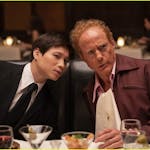Die-hard fans of either the Replacements or "Say Anything" already know that the Minneapolis band's song "Within Your Reach" accompanies the closing credits for the beloved movie. But the "Hootenanny" track almost became the tune blasting out of Lloyd Dobler's boombox in the 1989 film's most memorable scene.
"We thought that might be the song," said star John Cusack, who played Dobler and consulted with director/screenwriter Cameron Crowe on the soundtrack. "It was just so soulful and we thought it was perfect for the character and the era. But then Peter Gabriel showed up with "In Your Eyes."
You can expect more behind-the-scenes nuggets like that when Cusack takes questions Tuesday following a special screening of the film at the Ordway Center. The actor, whose credits also include "The Grifters," "High Fidelity" and "Grosse Pointe Blank," offered up a sneak preview by phone last month.
Cusack initially didn't want to do the film. By the mid-'80s, Cusack was ready to move on from teen comedies and act like a grown-up.
"I wasn't that keen on the idea," said the now 53-year-old actor, who was shooting "Eight Men Out" when co-star John Mahoney suggested that he read the script. "But I thought there was something there. I told Cameron that if we could rewrite it so the character would have more of a worldview and a sense of himself in the world, I'd be interested. The fact that he was an Army brat, listened to the Clash. That kind of thing."
Signing up meant taking a leap of faith. Crowe already had impressed studios with his screenplay for "Fast Times at Ridgemont High," but he had never directed a movie. Cusack, on the other hand, already had worked with some Hollywood heavyweights like Rob Reiner, John Sayles, John Hughes and James L. Brooks. But Cusack was won over by the newbie's passion.
"His enthusiasm was sort of contagious," he said. "Plus, there was a bunch of good people behind him like [producer] Polly Platt and [cinematographer] Laszlo Kovacs." Crowe would go on to make "Jerry Maguire" and "Almost Famous."
Mahoney is the film's secret weapon. The stage veteran wouldn't become a household name until he took on the role of the cantankerous father in "Frasier" four years later, but fellow Chicago actors like Cusack had long known that the late actor was special. In "Anything," he avoids turning the skeptical father into a stereotypical stick-in-the mud, singing along to "Rikki Don't Lose That Number" in the car and sinking into shame when he's arrested for embezzlement.
"Whatever he did, he did with humanity," Cusack said. "He was the perfect guy to turn out to have a dark secret because he was otherwise this charismatic personality. The story really doesn't work without a strong father-daughter relationship. That's the crux of the movie."
The Replacements weren't the only band that almost made the "boombox" scene. Before getting Gabriel's blessing, Crowe and Cusack considered a number of other tunes, even shooting the scene with Fishbone's "Turn the Other Way" blasting from the speakers. (Gabriel originally wouldn't give up the rights because he thought the song was going to be used for the John Belushi biopic, "Wired.") But the right music isn't the only reason the scene still resonates.
"We didn't really know if we could pull it off," said Cusack, who admits the moment easily could have come across as cheesy. "There's something about the character's eyes and how defiant he is in the moment. He's more hurt than anything else. That's a nice contrast to the big romantic gesture."





